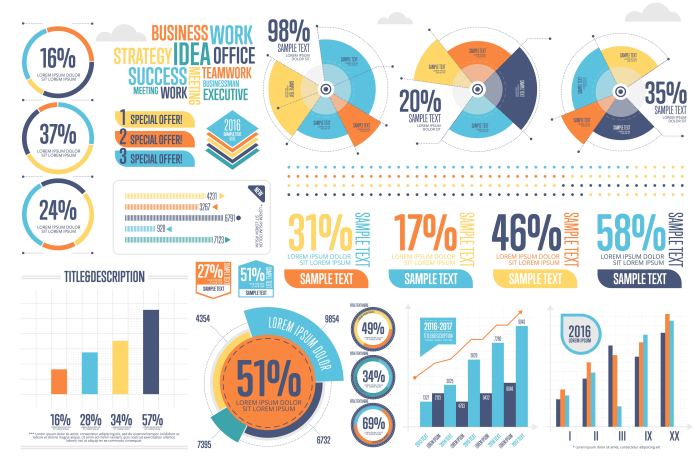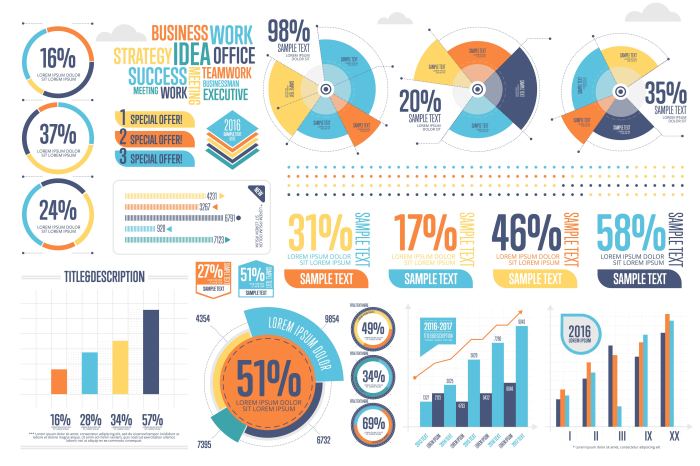
Corporate Power Facts and Stats: Unveiling the Influence
Corporate Power Facts and Stats: Unveiling the Influence – we often hear about the impact of corporations on our lives, but how much do we truly understand about their reach? From shaping government policies to dominating markets and influencing our daily choices, corporations wield significant power.
This exploration delves into the facts and statistics that shed light on the extent of corporate influence and its implications for society.
This blog post aims to provide a comprehensive overview of the various ways corporations exert influence, examining their impact on government, markets, labor, the environment, and social equality. We’ll delve into historical trends, current practices, and potential solutions to address the challenges posed by corporate power.
Corporate Influence on Government
The relationship between corporations and government has been a complex and evolving one throughout history. Corporations have long sought to influence government policies that benefit their interests, while governments have often relied on corporations for economic growth and stability. This dynamic has given rise to various mechanisms through which corporations exert their influence, including lobbying, campaign contributions, and revolving door practices.
Lobbying and Its Impact on Legislation
Lobbying refers to the act of attempting to influence the decisions of government officials, often through direct communication or advocacy. Corporate lobbying has played a significant role in shaping legislation for decades. Corporations employ lobbyists to advocate for policies that align with their business interests, such as tax breaks, deregulation, and subsidies.
It’s staggering to think that just 100 corporations are responsible for 71% of global greenhouse gas emissions, a clear example of how concentrated corporate power can have a devastating impact on our planet. This power dynamic also plays a role in the global hunger crisis, as causes of hunger are related to poverty , which is often exacerbated by corporate practices like land grabbing and price manipulation.
It’s a complex issue, but understanding the role of corporate power is crucial to finding solutions for a more just and sustainable future.
- Historical Overview: Lobbying has existed in various forms throughout history, with early examples found in ancient Rome and Greece. However, it gained prominence in the United States during the late 19th century, as industries like railroads and oil sought to influence government policies related to their operations.
The rise of powerful corporations and the growth of government regulation led to a surge in lobbying activities.
- Impact on Legislation: Corporate lobbying has had a significant impact on legislation across various sectors, including healthcare, energy, finance, and technology. Studies have shown a strong correlation between lobbying expenditures and favorable legislative outcomes for corporations. For instance, research by the Center for Responsive Politics found that industries with higher lobbying expenditures tend to receive more favorable legislation.
Examples of Corporate Influence
Corporations employ various strategies to influence government policies, including campaign contributions, lobbying efforts, and revolving door practices.
The sheer size and influence of corporate giants are staggering, and the pharmaceutical industry is no exception. These companies wield enormous power, often shaping the landscape of medical research and development. To understand the complex interplay between corporate power and healthcare, it’s crucial to explore the pharmaceutical corporations and medical research relationship, where financial incentives and scientific breakthroughs collide.
Ultimately, these corporate power facts and stats highlight the need for careful scrutiny and ethical considerations within the healthcare industry.
- Campaign Contributions: Corporations and their executives often contribute significant sums of money to political campaigns. These contributions can influence the political agenda of elected officials and increase the likelihood of policies favorable to the donor’s interests being adopted. For example, the pharmaceutical industry has historically contributed heavily to political campaigns, and their contributions have been linked to policies that favor drug pricing and research funding.
- Lobbying Efforts: Corporations hire lobbyists to advocate for their interests directly with government officials. Lobbyists engage in various activities, such as meeting with lawmakers, drafting legislation, and providing expert testimony. They aim to influence the legislative process and ensure that policies align with their clients’ interests.
For instance, the fossil fuel industry has actively lobbied against climate change regulations, arguing that such regulations would harm the economy and job creation.
- Revolving Door Practices: The revolving door refers to the movement of individuals between government and corporate positions. Former government officials often transition to high-paying jobs in the industries they previously regulated, potentially creating conflicts of interest and undermining public trust. For example, individuals with experience in the financial industry have often moved into positions in government agencies responsible for financial regulation, raising concerns about their ability to act impartially.
Potential for Undermining Democratic Principles
The influence of corporations on government raises concerns about the potential for undermining democratic principles and the public interest.
- Unequal Representation: Corporate influence can create an imbalance in the political system, favoring the interests of wealthy corporations over those of ordinary citizens. The ability of corporations to contribute heavily to campaigns and hire lobbyists can give them disproportionate influence on policymaking, potentially leading to policies that benefit a small number of powerful actors at the expense of the broader public.
- Corruption and Conflicts of Interest: Corporate influence can lead to corruption and conflicts of interest. The close relationships between corporations and government officials can create situations where personal gain or favoritism influence policy decisions. For example, the influence of the pharmaceutical industry on drug pricing has been criticized for potentially prioritizing corporate profits over the needs of patients.
- Erosion of Public Trust: The perception that corporations have undue influence on government can erode public trust in democratic institutions. When citizens believe that the political system is rigged in favor of powerful interests, they may become disengaged from the political process and lose faith in the ability of government to represent their interests.
Corporate Domination of Markets: Corporate Power Facts And Stats

The concentration of market power in the hands of a few corporations is a growing concern. This dominance can stifle competition, limit consumer choice, and ultimately harm the overall economy.
Market Concentration and Its Impact
Market concentration refers to the degree to which a few large firms control a particular industry. When a small number of companies hold a significant share of the market, it can lead to reduced competition and higher prices for consumers.
This lack of competition can also discourage innovation and hinder the development of new products and services.
- Reduced Competition:When a few firms dominate a market, they have less incentive to compete on price or innovation. This can lead to higher prices and fewer choices for consumers.
- Higher Prices:With limited competition, dominant firms can set prices higher than they would in a more competitive market. This can disproportionately affect low-income consumers who are more sensitive to price changes.
- Slower Innovation:Dominant firms may be less motivated to invest in research and development, as they face less pressure from competitors to innovate. This can stifle technological advancements and harm economic growth.
- Limited Consumer Choice:Consumers may have fewer choices when a few firms control a market. This can limit product variety, quality, and availability.
Strategies for Maintaining Market Dominance
Corporations employ various strategies to maintain their dominance in the market. These strategies can be legal or illegal, but they all aim to limit competition and strengthen their position.
- Mergers and Acquisitions:Corporations can merge with or acquire their competitors, eliminating competition and increasing their market share. This can create monopolies or oligopolies, where a few firms control a significant portion of the market.
- Vertical Integration:Corporations can control different stages of the production process, from raw materials to distribution. This can limit access to resources for competitors and make it harder for new firms to enter the market.
- Predatory Pricing:Dominant firms can engage in predatory pricing, setting prices below cost to drive out smaller competitors. Once competitors are eliminated, they can raise prices to recoup their losses and exploit their market power.
- Lobbying and Political Influence:Corporations can use their resources to influence government policy and regulations. This can include lobbying for favorable legislation, contributing to political campaigns, and engaging in revolving door practices, where executives move between government and corporate positions.
Antitrust Laws and Their Role, Corporate power facts and stats
Antitrust laws are designed to prevent monopolies and promote fair competition in the market. These laws aim to protect consumers from unfair business practices and ensure that markets operate efficiently.
- Sherman Antitrust Act (1890):This landmark law prohibits monopolies and conspiracies to restrain trade.
- Clayton Antitrust Act (1914):This law prohibits mergers and acquisitions that would substantially lessen competition. It also addresses price discrimination and tying arrangements.
- Federal Trade Commission Act (1914):This law created the Federal Trade Commission (FTC), which has broad authority to investigate and prevent unfair business practices, including anti-competitive behavior.
Corporate Impact on Labor
The relationship between corporate power and labor rights is complex and often contentious. While corporations are vital for economic growth and job creation, their pursuit of profits can sometimes come at the expense of worker well-being. This section explores the various ways corporate power influences labor rights, examining issues like wages, benefits, and working conditions.
Globalization and Automation
Globalization and automation have significantly impacted labor markets, creating both opportunities and challenges for workers. Corporations have increasingly shifted production to countries with lower labor costs, leading to job losses in developed nations. Automation, driven by technological advancements, has also led to the displacement of workers in various sectors.
Corporations play a crucial role in shaping these trends. Their decisions regarding outsourcing, investment in automation, and global supply chains directly influence employment patterns and worker well-being.
Corporate Practices Undermining Worker Rights
Corporations, in their pursuit of profit maximization, have engaged in practices that undermine worker rights, often leading to exploitation and inequality.
Outsourcing
Outsourcing involves transferring jobs to other countries, often with lower wages and weaker labor protections. This practice allows corporations to reduce labor costs and increase profits, but it can lead to job losses in the originating country and a decline in worker standards in the destination country.
Union-Busting
Corporations often engage in union-busting tactics to prevent workers from organizing and negotiating collectively. These tactics can include:
- Threatening job losses
- Hiring anti-union consultants
- Using surveillance to monitor union activities
By preventing unionization, corporations can maintain control over wages, benefits, and working conditions, often to the detriment of workers.
Wage Suppression
Corporations can suppress wages by:
- Employing workers in low-wage countries
- Using temporary or contract workers who lack benefits
- Resisting wage increases even when profits are high
These practices contribute to income inequality and make it difficult for workers to achieve a decent standard of living.
Corporate Environmental Impact
Corporations play a significant role in shaping the environment, both positively and negatively. Their operations, from resource extraction to manufacturing and distribution, have a profound impact on ecosystems, climate change, and human health. Understanding the environmental footprint of corporations is crucial for developing sustainable practices and mitigating the negative consequences of human activities.
Corporate Emissions and Resource Depletion
Corporations are major contributors to greenhouse gas emissions, a leading driver of climate change. The burning of fossil fuels for energy production, transportation, and industrial processes is a primary source of these emissions.
It’s mind-boggling to think about the sheer scale of corporate power, with some companies having revenues exceeding the GDP of entire nations. But this power isn’t always used for good. One alarming trend is the use of tax avoidance and havens, which undermine democracy by shifting the burden of funding public services onto the backs of ordinary citizens.
This further reinforces the imbalance of power, allowing corporations to operate with impunity while governments struggle to maintain essential services.
- According to the Intergovernmental Panel on Climate Change (IPCC), the energy sector accounts for approximately 73% of global greenhouse gas emissions.
- The World Resources Institute (WRI)estimates that the top 100 fossil fuel companies are responsible for 71% of global greenhouse gas emissions since 1988.
Resource depletion is another critical environmental issue. The extraction and use of natural resources, such as minerals, timber, and water, can lead to habitat loss, biodiversity decline, and soil degradation.
- The Global Footprint Networkestimates that humanity is currently using natural resources at a rate of 1.75 Earths, exceeding the planet’s ability to regenerate.
- The World Wildlife Fund (WWF)reports that over 60% of the world’s forests have been lost due to deforestation, driven in part by the demand for timber and agricultural land.
Corporate Power and Inequality
The concentration of wealth and income in the hands of a select few is a growing concern, and corporate power plays a significant role in this trend. Corporations, with their immense resources and influence, shape economic policies and market forces, often to their own advantage, contributing to the widening gap between the rich and the poor.
The Link Between Corporate Power and Income Inequality
The relationship between corporate power and income inequality is multifaceted. Corporations, driven by profit maximization, often prioritize shareholder returns over employee wages and benefits. This can lead to stagnant wages for the working class, while executive compensation continues to rise.
Additionally, corporations exert significant influence on government policies, advocating for tax cuts and deregulation that disproportionately benefit the wealthy. These policies can further exacerbate income inequality by reducing social safety nets and weakening labor unions.
Corporate Influence on Economic Policies
Corporations have a powerful voice in shaping economic policies that impact income distribution. They contribute heavily to political campaigns, lobby for favorable legislation, and maintain close relationships with government officials. This influence allows them to advocate for policies that benefit their bottom line, even if those policies may have negative consequences for workers and the broader society.
“The top 1% of earners in the U.S. now own more wealth than the bottom 90% combined.”
Institute for Policy Studies
The Impact of Corporate Power on Social Mobility and Access to Opportunity
Corporate power can also hinder social mobility and access to opportunity. Corporations often control access to education, healthcare, and other essential services, creating a system where opportunities are concentrated in the hands of a select few. This can perpetuate cycles of poverty and limit the ability of individuals from disadvantaged backgrounds to improve their socioeconomic status.
Examples of Corporate Power and Inequality
Several real-life examples illustrate the impact of corporate power on income inequality. For instance, the rise of monopolies and oligopolies in various sectors, such as technology and healthcare, has led to increased pricing power and reduced competition. This has allowed corporations to extract higher profits while consumers face higher costs for essential goods and services.
Regulating Corporate Power
The unchecked power of corporations can pose significant risks to the public interest, leading to market distortions, exploitation of workers, and environmental degradation. To mitigate these risks, governments have implemented various regulatory measures aimed at controlling corporate influence and promoting a fair and equitable society.
Antitrust Laws
Antitrust laws are designed to prevent monopolies and promote competition in the marketplace. They aim to ensure that consumers have access to a wide range of choices at fair prices.
- The Sherman Antitrust Act (1890) prohibits monopolies and price-fixing agreements.
- The Clayton Antitrust Act (1914) prohibits mergers and acquisitions that could lead to monopolies.
- The Federal Trade Commission Act (1914) established the Federal Trade Commission (FTC) to enforce antitrust laws and prevent unfair business practices.
Antitrust laws have played a crucial role in preventing the concentration of power in the hands of a few corporations. However, their effectiveness has been debated in recent years, with some arguing that they have become too weak to address the increasing consolidation of industries.
Consumer Protection Laws
Consumer protection laws aim to safeguard consumers from unfair or deceptive business practices. These laws address issues such as product safety, pricing, advertising, and data privacy.
- The Consumer Product Safety Act (1972) established the Consumer Product Safety Commission (CPSC) to regulate the safety of consumer products.
- The Fair Credit Reporting Act (1970) regulates the collection and use of consumer credit information.
- The Truth in Lending Act (1968) requires lenders to disclose the terms of credit agreements to borrowers.
Consumer protection laws have been effective in protecting consumers from harmful products and practices. However, the rapid evolution of technology and the rise of e-commerce have presented new challenges for consumer protection, such as data privacy and online fraud.
Labor Regulations
Labor regulations are designed to protect the rights of workers and ensure fair working conditions. These laws address issues such as minimum wage, overtime pay, workplace safety, and unionization.
- The Fair Labor Standards Act (1938) established minimum wage, overtime pay, and child labor standards.
- The Occupational Safety and Health Act (1970) established the Occupational Safety and Health Administration (OSHA) to ensure safe working conditions.
- The National Labor Relations Act (1935) protects the right of workers to organize and bargain collectively.
Labor regulations have been instrumental in improving working conditions and reducing exploitation. However, there are concerns about the effectiveness of these regulations in the face of globalization and the rise of gig work.
Potential New Regulations or Reforms
As corporate power continues to grow, there is a growing need for new regulations or reforms to address the challenges posed by corporate influence.
- Strengthening Antitrust Enforcement: Some experts argue that antitrust laws need to be strengthened to address the increasing consolidation of industries. This could include stricter merger guidelines, increased enforcement of existing laws, and greater scrutiny of dominant companies.
- Corporate Social Responsibility Regulations: Some propose regulations that would require corporations to consider the social and environmental impact of their activities. This could include mandatory reporting on environmental performance, labor practices, and human rights.
- Increased Transparency and Accountability: Increased transparency and accountability measures could help to curb corporate influence. This could include requiring corporations to disclose more information about their lobbying activities, political spending, and financial dealings.
These proposed reforms aim to create a more level playing field and ensure that corporations are held accountable for their actions.






